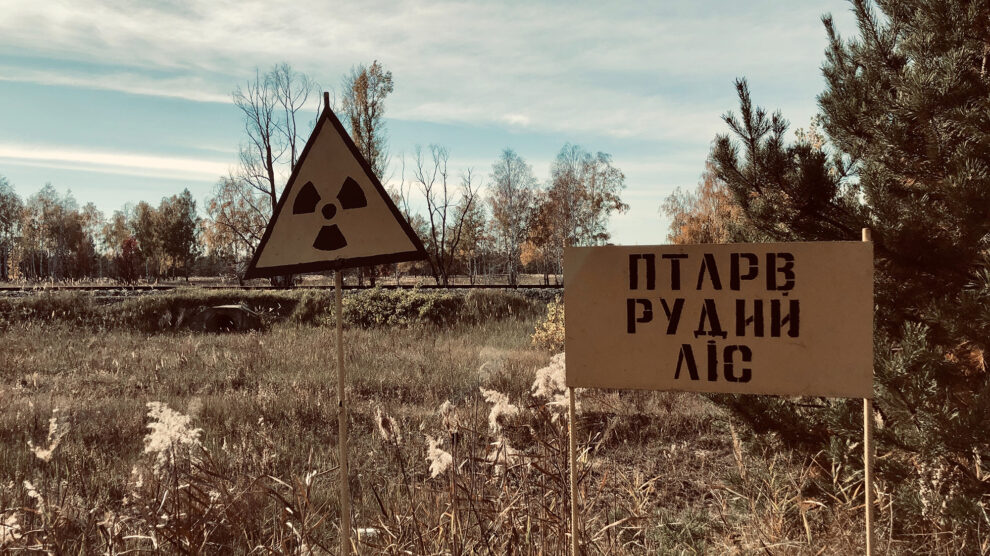Chapter and Working Group Reports, Autumn 2019
Reports from Science for the People working groups and chapters
SftP Retreat, Blacksburg Chapter, Labor Working Group, Science for Puerto Rico, Social Sciences Discussion Group
Volume 22, number 2, The Science We Need
Retreat to Advance! Science for the People Retreat in East Tennessee
By Ben Allen
In our extremely online times, bringing people together face-to-face for a real-time conversation about organizing can be a powerful experience. Like many organizations, Science for the People relies on an array of digital communications to help connect us to each other and the world, while of course understanding the negative repercussions and limitations of the digital sphere. Some conversations simply can’t be had within the brevity of an hour call. So, what else can you do except get everyone together and retreat into the hills of East Tennessee?
In June of 2019, some forty members of Science for the People gathered at the Highlander Center for Research and Education, a few miles east of Knoxville, Tennessee, for our first organization-wide retreat since our revitalization. Highlander has been a center of gravity for freedom fighters and radicals from labor, anti-racism, and environmental movements in the southern US for many decades. It proved to be the perfect space for our gathering, not just because of its history, but because it is a home for so many of today’s leading lights in movement work, and the staff embody the spirit and history of the place in their care and intentionality with everyone who comes through. Since its creation, Highlander has always been on the radar of forces acting against movements for freedom and justice, as was the case in March 2019 when arsonists destroyed a building on the grounds. This knowledge was humbling and grounding for us throughout the weekend.
We spent much of the planned parts of the retreat focused on envisioning the future of the organization, assessing our history so far, and building unity around common goals for the organization, including internal communications and coalition building with other radical groups. We also built in a significant amount of social time to develop interpersonal relationships between members and better get to know each other. The combination proved to be a valuable experience that enabled us to step back, refocus, think creatively, and re-energize. The daytime agenda started with a brainstorming session to encourage us to think big about what our organization could do. Following that, we stepped through some conversation to assess what SftP does well and what we need to change to grow and then set some goals for both the organization and publication. Much of this conversation pointed to the need to deepen our commitment to developing strategy for organizing, education, and activism to ensure that we make bigger impacts as we grow through our chapters and the magazine platform.
The afternoon of the first full day gave us a sense of the breadth of activity that SftP members are engaged with, as the various working groups showcased their work fighting militarism in science, campaigning for a People’s Green New Deal, and showing solidarity with Puerto Rico post-Hurricane María. Perhaps the most special of these presentations was from veterans of the original SftP, sharing their experience of organizing from the late sixties through the eighties, which helped develop our sense of multigenerational continuity while learning from their experiences.By the end of retreat, there was a palpable sense of boosted morale, spirit, and sense of purpose for us moving forward. It was quite heartening to hear from many that the experience strengthened their identification with SftP as their political home and to see so many people come together, from California to Boston, in a relatively short time. There are still plenty of organizing challenges ahead as both the political and planetary climates heat up and the stakes get higher for radical science. Over the coming months we’ll be hardening our strategies and tactics and preparing for future public gatherings to share with everyone our commitment and ideas to grow Science for the People.
Find contact information for working groups and local chapters at scienceforthepeople.org, or write to mail@scienceforthepeople.org.
Blacksburg, VA, chapter
By Jack Leff and Lydia Patton
The Blacksburg, Virginia, chapter is up and running, having formed in the 2018-19 academic year. Core members of the group come from the Science, Technology, and Society Department at Virginia Tech, but the group plans to draw membership from a broad coalition of activist and scientific groups on campus, including the Environmental Coalition, Protect Our Water Heritage Rights (POWHR), Virginia Organizing, and the Blacksburg Coalition for Social Justice.
We have organized around a current set of projects:
- Supporting the aims and demands of the Student’s Climate Strike.
- Supporting pipeline protesters and allies in the Blacksburg area.
- Promoting a 100 percent renewable energy grid by 2030.
- Organizing against coal-fired power plants and local polluters generally.
- Working with Virginia Organizing to lift up local community organizing, including writing grants for community activist projects.
- Building a coalition of scientists and engineers who support science for the people.
We have hosted events locally and participated in events hosted by others, including the Climate Strike on campus and an Environmental Justice Workshop held in September 2019.
Our aim this year is to ramp up our membership and to reach out to the community of scientists on campus.
Write to blacksburgsftp@riseup.net to find out more, and to join our new chapter!
Labor Working Group Report
By Peter Malonis
The proposed Green New Deal legislation seeks to transform the economy in the interest of workers while addressing the climate crisis. While the idea that worker rights and the environment are interdependent has gained traction in the last year due to publicity generated by media-savvy organizations like the Sunrise Movement, as well as politicians such as Alexandria Ocasio-Cortez, elements of the labor movement have been pushing for such a program for some time. The Labor Network for Sustainability (LNS), founded in 2010, aims to be a catalyst for building a vision for a Green New Deal from within US unions. In June 2019, I attended the organization’s third Labor Convergence on Climate in Chicago, which brought together union officials and rank-and-file members as well as representatives from environmental NGOs, including speakers such as United Mineworkers of America President Cecil Roberts and Association of Flight Attendants President Sara Nelson. The conference consisted largely of speeches and panels laying out a vision for climate action and reporting on local and state initiatives. It also featured a workshop on how union members can talk to their unions about the climate crisis.
While there are other labor organizations, such as the Blue Green Alliance, dedicated to environmental issues, LNS President Joe Uehlein told me that what distinguishes the LNS is that it is not a coalition, and therefore not limited by the minimum platform that leaders of various unions can agree to. Instead, the LNS is organized around an ambitious platform and seeks to draw in unionists who share it. Uehlein characterized that platform as one that “accepts science,” criticizing existing labor coalitions for a lack of necessary urgency in addressing climate change. However, the LNS platform goes beyond simply accepting the science on climate change. It advocates the deployment of particular technologies, including a 100 percent renewable energy system, and is critical of technologies such as nuclear energy and carbon capture as part of a solution to climate change.1 While hoping to gain influence within organized labor in order to build a broader movement, there is little indication that LNS leaders intend to negotiate their position on these technologies when confronted with the concerns and priorities of the various unions in the energy sector and their memberships.
The potential pitfalls of this approach were highlighted by a talk given by David Campbell, Secretary-Treasurer of United Steelworkers (USW) Local 675. Campbell presented one of the most radical visions at the conference, stating clearly from the outset that the climate crisis can only be addressed by a grassroots, working class movement independent of the Democratic party. He told a story from his union that he described as illustrating what happens when environmentalists abandon the principle of a just transition for workers. Local 675 represents workers at an oil refinery in Torrance, California, where a 2015 explosion nearly caused a release of modified hydrofluoric acid (MHF). Such a release could have exposed thousands of nearby residents to a deadly airborne cloud of the chemical. Prior to the explosion, USW had warned of the dangers of MHF at refineries and advocated to end its use.2 Following the explosion, the union worked with environmental and community groups to fight for better safety, including an action in which they dumped a pile of horse manure outside the refinery as a metaphor for the refinery owner’s rhetoric. Significant improvements in safety were made in the years after the explosion. But the coalition between the union and environmentalists broke down when environmentalists demanded that a local regulatory board institute an immediate ban on the use of the MHF in the refining process. The union opposed this move because it would lead to the plant being shut down for at least a year and possibly permanently. The new refining process would involve shipping in large quantities of sulfuric acid, which has its own safety problems. The union’s preferred solution was to allow four years to move away from the MHF process, which they felt was sufficient time for research into a new refining process which could eliminate the use of dangerous catalysts altogether. However, the debate came to a stalemate, and in the end the regulators did not ban MHF and made no plans to phase it out.
This cautionary tale is particularly relevant at a time when environmentalists are often quick to define their climate programs by particular technologies and deadlines without significant input from workers or unions. This is not a conflict between jobs and the environment, but between an approach to technology that centers democratic planning and one that sees certain technologies as inherently unacceptable.
While questions remain about the future direction of the organization, the LNS convergence demonstrated the commitment of a significant base of union activists to overcome the false narrative of jobs versus the environment. The conference exposed opportunities for the labor and environmental movements to grow, including a challenge led by a newly formed People of Color caucus to bring more attention to racial oppression and to invite more speakers of marginalized backgrounds. A labor movement that can embrace criticism and calls to change from all workers will ultimately be in a stronger position to shape the energy transition.
Sowing Solidarity: Science and Social Justice in Puerto Rico
By Bolívar Aponte Rolón
September 20, 2019, marked the second anniversary of the passing of Hurricane María through Puerto Rico and the Caribbean. This is not a joyful occasion like a wedding or the founding of a country. Instead, it is a date that brings sadness and fear for many. Shortly after the second anniversary of Hurricane María, Puerto Ricans braced for yet another season of potentially devastating storms. Facing hurricanes in the Caribbean is part of daily life, as common as, but much more destructive than, snowstorms further north. But for Puerto Ricans, a hurricane is not just another hurdle of life in the tropics, currently exacerbated by climate change: it is part of the ongoing struggle against colonialism and discrimination, first under the Spanish empire, and now, since 1898, under US control. The island’s people are examples of resilience and determination against all odds, and of hope and cooperation against all adversities across race and class lines. While these stories can move even the most stoic individuals, they should not have to be told. They highlight the local government’s incapacity to respond to such devastating natural phenomena and the US government’s blatant discrimination against Puerto Ricans, based on a long history of colonialism.
The growing Puerto Rican diaspora in the US is a direct consequence of the inefficient governmental response.3 The diaspora responded by sending supplies or traveling to support recovery efforts. In conjunction with a larger movement of solidarity to inform people about the plight of Puerto Ricans, Science for the People has partaken in this through the launching of a solidarity brigade and participating on various forums throughout the US through our working group, Science for Puerto Rico.
On September 12, 2019, Harvey Mudd College (HMC), a STEM-focused college in Claremont, California, hosted a panel titled Science for Social Justice in Puerto Rico. Invited speakers were all Puerto Rican scientists: Greetchen Díaz-Muñoz, PhD, director of CienciaPR, a nonprofit organization committed to the promotion of science and science-education careers throughout PR; Juan Declet-Barreto, PhD, climate scientist at the Union of Concerned Scientists; and myself, Bolívar Aponte- Rolón of the Puerto Rico Solidarity Working Group of Science for the People.
At the event, we talked with other Puerto Ricans abroad, sharing what it was like to experience the hurricane from afar, not hearing from our families for weeks, and how as Puerto Ricans we can support each other in the diaspora by telling our stories.4 Later meetings at the event were spent exchanging ideas on social justice and the role that science plays in it, especially in the context of HMC and higher education.
One of the main objectives of the event was to brainstorm ideas and share experiences on successful programs involving science and social justice. HMC’s professors and staff are dedicated to connecting science with social justice and broadening students’ experience of real-world applications of science beyond industry and tech companies. Led by questions from event organizer Alyssa Newman, a postdoctoral fellow at the Department of Humanities, Social Sciences, and the Arts at HMC, the panel was an exchange of experiences in the aftermath of Hurricane Maria and our ideas for the future. The panelists also shared our personal struggles with the storm and what it represents in their lives. As one audience member put it: “Thank you for this intimate conversation about science and social justice in Puerto Rico.”
The Science for the People Puerto Rico working group is excited to continue its work and collaborations in support of socially and environmentally just recovery efforts. If you are interested in participating in any form or have ideas you wish to act on, feel free to contact us. We meet the last weekend of every month and are currently planning a solidarity brigade for spring/summer 2020.
Contact:
Email: sfpr-wg@scienceforthepeople.org
Join the Social Sciences for the People Discussion Group
Central to the activism of Science for the People are understandings of what science is and how it relates to other ways of knowing and being. What constitutes democratic access to scientific knowledge? Which forces shape scientific research, and how? In what ways can movements change society? What equitable futures can we imagine and work toward?
Since its inception, Science for the People has engaged in fruitful exchanges with work in social sciences and humanities that has theorized, investigated, and reflected on these and related issues. SftP activists are joining in a conversation on the role social sciences and humanities play in SftP, and on the stances and actions SftP should take toward and within these fields of knowledge as presently practiced.
If you would like to take part in these discussions please sign up for the Social Sciences for the People mailing list at groups.google.com/forum/#!forum/social-sciences-ftp.
- Liz Shuler, “Shuler at Third Way: Nuclear Power is Good for the Labor Movement” (speech, Washington, DC, February 21, 2017), AFL-CIO; Rachel M. Cohen, “The Environmental Left Is Softening on Carbon-capture Technology. Maybe That’s OK,” The Intercept, September 20, 2019.
- “A Risk Too Great: Hydrofloric Acid in US Refineries,” United Steel Workers and Tony Mazzocchi Center for Health, Safety and Environmental Education, April 2013.
- John D. Sutter and Sergio Hernández, “’Exodus’ from Puerto Rico: A visual guide,” CNN Investigates, February 21, 2018.
- Gabrielle Lenhard, “Understanding Puerto Rico through Diaspora,” Ark Republic, August 31, 2018.





